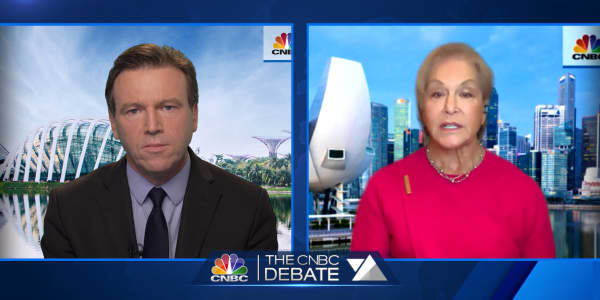
The U.S.-China trade war could lead to a technological split between Asia and America that could benefit investors, James Coulter, the co-chief executive of private equity firm TPG Capital, said Friday.
"As politics have come into the picture, we're beginning to see very different setups for the tech marketplaces in Asia and in the U.S.," Coulter told CNBC at the Singapore Summit.
Over the past year, Washington and Beijing have been locked in a trade dispute. Some key sticking points in ongoing negotiations include technological issues like alleged intellectual property theft and forced technology transfers.
'Splinternet'
Amid few signs of progress, investors and analysts have started to discuss what an internet split between the U.S. and China, or "splinternet," would look like. The countries already compete for technological dominance across internet services and applications.
But Coulter said a fragmented internet may in fact be a silver lining for investors.
"This world of two tech stacks, I think, is going to be a fascinating setup for investment opportunities," Coulter added.
It's not that the trade war is good or bad … it's just that we don't know what it is yet, and that means we should stay out of the neighborhood where it can affect us.James Coulterco-CEO of TPG Capital
He cautioned, however, that these opportunities may take time to manifest.
"It's a long game," he said. "If you look at tech companies over time, in particular the winners, it often takes a while for market expectations, reality, and performance to combine."
TPG invested in ride-hailing pioneer Uber since the early 2010s, when the company was valued around $3.5 billion, Coulter said. When Uber made its market debut in May, the company was valued at around $70 billion.
Asked about home-sharing platform Airbnb, Coulter said it was a "great company." Airbnb, which was valued at more than $30 billion in 2016 and 2017 financing rounds, recently announced that it intends to go public in 2020.
Where to invest in Asia
Apart from tech, Coulter also said he's also investing in the consumer goods sector in Asia, including health care and education.
Education is high on the spending patterns of Asian parents, he said. A 2017 report from HSBC showed that Hong Kong, Singapore and Taiwan were among the top five countries where parents spent the most on their children's education.
This is a change from his strategy of investing in Asian export companies, Coulter said.
Investing in education and health care, which are centered in Asia, is a way to "insulate (himself) … from the uncertainty" of the trade war, Coulter said.
"It's not that the trade war is good or bad … it's just that we don't know what it is yet, and that means we should stay out of the neighborhood where it can affect us," he said.




